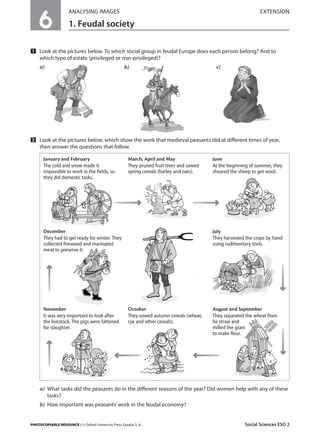06 rya 01
- 1. 6 ANALYSING IMAGES EXTENSION 1. Feudal society áš Look at the pictures below. To which social group in feudal Europe does each person belong? And to which type of estate (privileged or non-privileged)? a) b) c) áš Look at the pictures below, which show the work that medieval peasants did at different times of year, then answer the questions that follow. January and February The cold and snow made it impossible to work in the fields, so they did domestic tasks. March, April and May They pruned fruit trees and sowed spring cereals (barley and oats). December They had to get ready for winter. They collected firewood and marinated meat to preserve it. November It was very important to look after the livestock. The pigs were fattened for slaughter. June At the beginning of summer, they sheared the sheep to get wool. July They harvested the crops by hand using rudimentary tools. October They sowed autumn cereals (wheat, rye and other cereals). August and September They separated the wheat from he straw and milled the grain to make flour. a) What tasks did the peasants do in the different seasons of the year? Did women help with any of these tasks? b) How important was peasantsâ work in the feudal economy? PHOTOCOPIABLE RESOURCE / ÂĐ Oxford University Press EspaÃąa S. A. Social Sciences ESO 2
- 2. 6 ANALYSING IMAGES EXTENSION 1. Feudal society Answer key áš a) peasant, non-privileged estate b) knight, privileged estate c) monk, privileged estate áš a) In spring, they pruned fruit trees and sowed spring cereals (barley and oats). In summer, they sheared sheep, harvested the crops, separated the wheat from the straw and milled the grain to make flour. In autumn, they sowed autumn cereals (wheat, rye, etc.) and fattened the pigs for slaughter. In the harshest winter months, they collected firewood, preserved meat and did various domestic tasks. Women helped with all of these tasks. b) Peasantsâ work was essential because they produced all the food that was eaten in the fief: they grew crops, reared livestock, picked wild fruit, collected honey, etc. ÂĐ Oxford University Press EspaÃąa S. A. Social Sciences ESO 2


